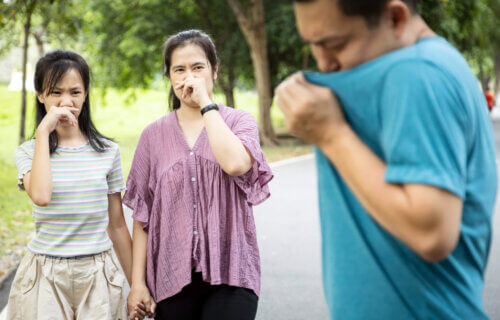PARIS, France — Sniffing sweaty armpits may hold the key to relieving social anxiety, according to new research. Everyday activities such as meeting strangers, speaking on the phone, or even going to work can trigger the mental health issue. Now, scientists have found that odors from other people’s sweat can help treat the condition.
The overwhelming fear of social situations typically develops during teenage years and can have long-term implications. Symptoms include feeling sick, hot flushes, trembling, or even panic attacks.
However, these issues fell by nearly 40 percent when patients underwent mindfulness therapy and researchers exposed them to human “chemo-signals.”
The smelly samples came from the underarm sweat of volunteers, commonly called “BO” or body odor.
“Our state of mind causes us to produce molecules (or chemo-signals) in sweat which communicate our emotional state and produce corresponding responses in the receivers. The results of our preliminary study show that combining these chemo-signals with mindfulness therapy seem to produce better results in treating social anxiety than can be achieved by mindfulness therapy alone,” says project leader Elisa Vigna of the Karolinska Institute in Sweden in a media release.

Social anxiety can be crippling for patients
Current treatments help anxiety sufferers be more in the moment by focusing on their senses and concentrating on their breathing — even when alone.
“We found that individuals who undertook one treatment session of mindfulness therapy together with being exposed to human body odors showed about 39% reduction in anxiety scores. For comparison, in the group receiving only mindfulness (i.e., the control group) we saw a 17% reduction in anxiety scores after one treatment session,” Vigna adds.
Social anxiety, or phobia, is a common mental health condition where people worry excessively about being with others. Scientists believe cases are rising since the start of the COVID-19 pandemic following lockdowns — particularly among women.
It can be crippling and potentially wreck a person’s life. They may turn down a promotion that involves public speaking or shun friends and work parties. They may even dread shopping or going on vacation because of the excessive fear about being with others.
Does your sweat change based on the movie?
The team collected sweat samples as people watched short clips from movies such as horror flick “The Grudge” and comedies like “Mr. Bean’s Holiday” and “Sister Act.” Researchers did this to see if specific reactions while perspiring had differing effects.
The 48 patients, all women between 15 and 35 years-old, were divided into three groups of 16 people and, over a period of two days, underwent mindfulness therapy for social anxiety. They were simultaneously exposed to one of the different odors while a control group smelt only clean air.
“We found that the women in the group exposed to sweat from people who had been watching funny or fearful movies, responded better to mindfulness therapy than those who hadn’t been exposed. We were a little surprised to find that the emotional state of the person producing the sweat didn’t differ in treatment outcomes – sweat produced while someone was happy had the same effect as someone who had been scared by a movie clip. So there may be something about human chemo-signals in sweat generally which affects the response to treatment,” the study author continues.
“It may be that simply being exposed to the presence of someone else has this effect, but we need to confirm this. In fact, that is what we are testing now in a follow-up study with a similar design, but where we are also including sweat from individuals watching emotionally neutral documentaries. This should allow us to tease out whether any potential therapy benefits stem from the unconscious perception of specific emotional signals, or whether it is simply to do with human presence, irrespective of emotion.”
Is human sweat carrying different messages?
The Swedish team is hopeful the treatment may lead to a new way of helping people with the condition by increasing effectiveness of e-health interventions such as meditation apps. It may also provide an additional opportunity for those who don’t respond to these programs.
Human sweat is complex in the way it carries information. The researchers are working with Italian scientists who have identified over 300 separate compounds. Study authors hope to isolate the molecules which are causing the effects seen in the study to improve therapeutic potential.
Vigna presented the findings at the European Congress of Psychiatry in Paris.
“We welcome this study, looking at one of the least researched senses and its interaction with mental health. The findings are interesting but will need to be robustly replicated by independent researchers,” concludes Dr. Julian Beezhold from the University of East Anglia, who is also the Secretary General of the European Psychiatric Association.
South West News Service writer Mark Waghorn contributed to this report.

